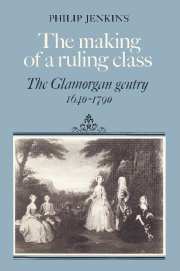Book contents
- Front matter
- Contents
- List of maps and tables
- Acknowledgments
- Abbreviations
- General introduction
- PART I SOCIAL AND ECONOMIC STRUCTURE
- PART II LOCAL AND NATIONAL POLITICS
- Introduction
- 4 Law and order
- 5 Political history 1640 – 1688: the heroic age
- 6 Political history 1688 – 1790: the new order
- Conclusion to Part II
- PART III SOCIETY AND CULTURE
- Conclusion to Part III: ‘conspicuous antiquity’
- Aftermath: towards the Victorian world
- Conclusion: from Civil War to Industrial Revolution
- Appendix 1 Parliamentary service by Glamorgan landowners 1640 – 1800
- Appendix 2 The ‘secondary’ gentry families
- Appendix 3 The ‘tertiary’ families
- Appendix 4 The Mansell family and their connections with the greater gentry
- Appendix 5 The roundhead and puritan family links of the Thomases of Wenvoe
- Notes
- Index
- Front matter
- Contents
- List of maps and tables
- Acknowledgments
- Abbreviations
- General introduction
- PART I SOCIAL AND ECONOMIC STRUCTURE
- PART II LOCAL AND NATIONAL POLITICS
- Introduction
- 4 Law and order
- 5 Political history 1640 – 1688: the heroic age
- 6 Political history 1688 – 1790: the new order
- Conclusion to Part II
- PART III SOCIETY AND CULTURE
- Conclusion to Part III: ‘conspicuous antiquity’
- Aftermath: towards the Victorian world
- Conclusion: from Civil War to Industrial Revolution
- Appendix 1 Parliamentary service by Glamorgan landowners 1640 – 1800
- Appendix 2 The ‘secondary’ gentry families
- Appendix 3 The ‘tertiary’ families
- Appendix 4 The Mansell family and their connections with the greater gentry
- Appendix 5 The roundhead and puritan family links of the Thomases of Wenvoe
- Notes
- Index
Summary
Introduction
As in the economic sphere, the landed gentry normally exercised thorough control of everyday life in the county through the machinery of administration and law enforcement. By the late seventeenth century, the gentry had removed rivals to their power both from above (government supervision) and below (radical municipal corporations). They secured their independence, and a near hereditary right to offices like JP or deputy-lieutenant. The only issues in local government seemed to be the problem of making these men work at enforcing the law, or else extending the commission of the peace to include enough lesser squires who would take on the burden of governing – both very serious problems.
But we find a basic paradox here, one that is important for understanding the nature of gentry power after 1700. With the consolidation and advancement of gentry power, it might seem as if the countryside was as peaceful as any time before or since, and that this would be particularly true of the Vale. But social relationships were subject to serious strains. New families entered the county community, new social groups took over the Bench – and the basic standards and values of those enforcing the law changed from about the 1720s. Any semblance of “paternalism” now broke down, as the common people found themselves facing the justice of the lawyers, clergy and stewards whom they hated or despised as greedy tyrants.
- Type
- Chapter
- Information
- The Making of a Ruling ClassThe Glamorgan Gentry 1640–1790, pp. 78 - 100Publisher: Cambridge University PressPrint publication year: 1983

